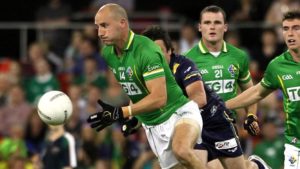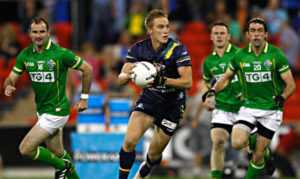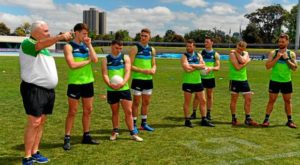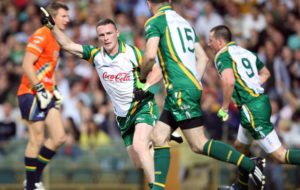This is the time of year when the International Rules gets its fair share of knockers and doubters towards the game. That’s absolutely fair enough and everyone is entitled to their own opinion. An argument that comes up time and again when the rules is on is why the GAA can’t spend more money on reviving the Railway Cup. I’m all on for the spark to be back in the Railway Cup but I can’t for the life of me ever see it getting back to the crowds that it once had and, for that matter, I can’t see it getting anywhere near the crowds that the International Rules gets.
 The reason I say this is from experience. I have been fortunate enough to represent both Ulster and Ireland on many occasions. After the 2006 fiasco of the second International Rules match, the GAA decided that they were going to take a year out to consider its future. That year out was a massive opportunity for the Irish public that slate the International Rules each year to come out in force and to support the Railway cup. Did this happen? Certainly not. The Railway Cup was played in October of 2007 so therefore it took centre stage when you take the club scene out of it. Furthermore, the GAA decided to play the final between Ulster and Munster in Croke Park. The players loved it but I can assure you it was an eerie place to play in front of a crowd of less than 500. For all the talk about how shit the International Rules is, it never gets crowds this low so for me it has more of a future than the Railway Cup. In actual fact, I only received my medal this year for winning that title in Croke Park. A full six years after retiring from the Intercounty game.
The reason I say this is from experience. I have been fortunate enough to represent both Ulster and Ireland on many occasions. After the 2006 fiasco of the second International Rules match, the GAA decided that they were going to take a year out to consider its future. That year out was a massive opportunity for the Irish public that slate the International Rules each year to come out in force and to support the Railway cup. Did this happen? Certainly not. The Railway Cup was played in October of 2007 so therefore it took centre stage when you take the club scene out of it. Furthermore, the GAA decided to play the final between Ulster and Munster in Croke Park. The players loved it but I can assure you it was an eerie place to play in front of a crowd of less than 500. For all the talk about how shit the International Rules is, it never gets crowds this low so for me it has more of a future than the Railway Cup. In actual fact, I only received my medal this year for winning that title in Croke Park. A full six years after retiring from the Intercounty game.
 To represent Ireland and to become an International player (and yes, I would say that I always felt like an International player throughout my Rules career) it takes serious dedication and a commitment to travel to Dublin each weekend for almost two months of trials and training. Training is normally on a Friday night with a stayover in Dublin and then the second session of the weekend takes place on the Saturday morning. Players with club commitments are always excused – from my understanding anyway. After the second session, there could be a briefing session on the rules with the officials or there could be video analysis work to be done. After that, you then travel home with most players playing some form of club football on the Sunday. That’s the type of effort that must be put in for any of the players to stand a chance to being selected. I applaud them all for their effort.
To represent Ireland and to become an International player (and yes, I would say that I always felt like an International player throughout my Rules career) it takes serious dedication and a commitment to travel to Dublin each weekend for almost two months of trials and training. Training is normally on a Friday night with a stayover in Dublin and then the second session of the weekend takes place on the Saturday morning. Players with club commitments are always excused – from my understanding anyway. After the second session, there could be a briefing session on the rules with the officials or there could be video analysis work to be done. After that, you then travel home with most players playing some form of club football on the Sunday. That’s the type of effort that must be put in for any of the players to stand a chance to being selected. I applaud them all for their effort.
 On the current series, Ireland go into the second test in Perth tomorrow looking to overturn a 10-point deficit. They are capable of doing this as long as the players play with composure and not to panic when being put under pressure by the Australians. Conor McManus and Michael Murphy were in excellent form last week but there cannot be an over-reliance on them for this week because they will be heavily marshalled by the professionals. The chance is for players like Enda Smith, Niall Sludden, Conor Sweeney, Shane Walsh, Niall Grimley and Gary Brennan to step up and contribute more to the scoreboard in the same manner that they do with their respective clubs and counties each weekend. There were over 20,000 spectators in Adelaide last weekend without much of an effort from the Australians to promote the game. Given the fact that there is only 10 points in it, I would expect more of a crowd this weekend and the Irish presence in Perth will show. The International Rules is not a game for everyone but trust me, when those players are presented with their jerseys by Joe Kernan in his last ever match as a manager, they will feel like credible internationals at that point. Best of luck to Joe and all the lads.
On the current series, Ireland go into the second test in Perth tomorrow looking to overturn a 10-point deficit. They are capable of doing this as long as the players play with composure and not to panic when being put under pressure by the Australians. Conor McManus and Michael Murphy were in excellent form last week but there cannot be an over-reliance on them for this week because they will be heavily marshalled by the professionals. The chance is for players like Enda Smith, Niall Sludden, Conor Sweeney, Shane Walsh, Niall Grimley and Gary Brennan to step up and contribute more to the scoreboard in the same manner that they do with their respective clubs and counties each weekend. There were over 20,000 spectators in Adelaide last weekend without much of an effort from the Australians to promote the game. Given the fact that there is only 10 points in it, I would expect more of a crowd this weekend and the Irish presence in Perth will show. The International Rules is not a game for everyone but trust me, when those players are presented with their jerseys by Joe Kernan in his last ever match as a manager, they will feel like credible internationals at that point. Best of luck to Joe and all the lads.
For what it’s worth, I played in six different series from 2003 to 2011 alongside many fine footballers. Not all good Gaelic footballers make good International Rules players but out of the guys I had the honour to play alongside, here is my top 15.
1. Stephen Cluxton (Dublin)
2. Sean Marty Lockhart (Derry)
3. Graham Canty (Cork)
4. Ciaran McKeever (Armagh)
5. Tom Kelly (Laois)
6. Kieran McGeeney (Armagh)
7. Aidan O’Mahony (Kerry)
8. Kevin Reilly (Meath)
9. Sean Cavanagh (Tyrone)
10. Colm Begley (Laois)
11. Michael Murphy (Donegal)
12. Tadhg Kennelly (Kerry)
13. Leighton Glynn (Wicklow)
14. Kieran Donaghy (Kerry)
15. Benny Coulter (Down)

